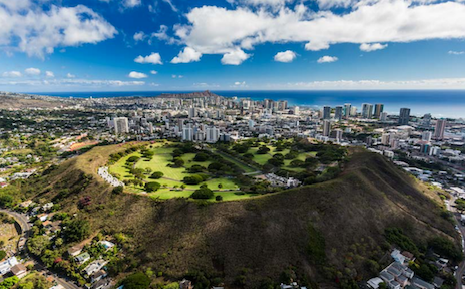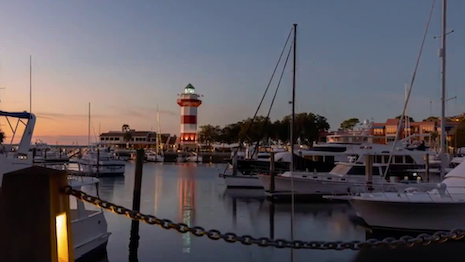 Hot air ballooning at Four Seasons Safari Lodge Serengeti. Image credit: Four Seasons
Hot air ballooning at Four Seasons Safari Lodge Serengeti. Image credit: Four Seasons Due to the COVID-19 pandemic, the travel industry is expected to lose nearly $4 trillion, significantly impacting global destinations that rely heavily on tourism for economic growth.
As the industry scrambles to recover, values founded on sustainability and community are expected to set a new precedent for luxury travel. During a session at Condé Nast Traveler’s Points of View Summit on Nov. 16, industry experts agreed that the “Great Travel Reset” should not be an excuse to revert to pre-pandemic behavior, but rather an opportunity to chart and new course and create a healthier, more inclusive travel model.
“There is a fear of traveling to destinations that are not heavily vaccinated, but those destinations need you now more than they ever did before to aid their recovery,” said Naledi K. Khabo, CEO of Africa Tourism Association.
“The onus is on the traveler to be responsible when visiting those destinations — being responsible and respectful.”
Safety remains a priority
As the world continues dealing with the COVID-19 virus, and vaccine proliferation remains imbalanced, safety is still a top priority for all travelers and hosts.
“Travelers must evaluate their travel decisions on a destination by destination basis,” Ms. Khabo said. “It’s about being a responsible traveler — adhere to requirements, show your testing, be vaccinated.”
While travel fuels many destinations’ economic growth and local government have implemented strategic plans to bring tourists back in safely, some locals have begged visitors to stay home, especially in Hawaii.
“It’s not that we do not want visitors,” said Kalani Ka‘anā‘anā, chief brand officer of Hawaii Tourism Authority. “It’s that we want visitors who come with good intentions, and who understand that there is a certain level of reciprocity needed between visitors and hosts.
“Residents feel that we have lost that balance or reciprocity, and want it back.”
 The state of Hawaii has implemented a Destination Management Action on each of its islands through 2024. Image credit: Hawaii Tourism Authority
The state of Hawaii has implemented a Destination Management Action on each of its islands through 2024. Image credit: Hawaii Tourism Authority
While vaccination distribution remains heavily imbalanced, some countries where these numbers are low, such as Colombia, appear vigilant in their measures to limit the spread of the virus, doing their part as travel destinations keep tourists safe.
After more than 18 months of lockdowns, restrictions and stress resulting from the COVID-19 pandemic, affluents are eager to travel again for the holiday season. Travel experts anticipate travelers will be flocking to popular spots including the Caribbean, Mexico and Europe (see story).
Although vaccinations are available and several destinations are welcoming back tourists, travelers do need to be thoughtful and prepared when planning and embarking on their trips, acknowledging safety measures and possible limitations.
According to the Centers for Disease Control and Prevention, face coverings can still significantly lower the risk of spreading the COVID-19 virus and its Delta variant.
“It was incredibly comforting, for me as a traveler, to go to Colombia and see every person embracing safety masks,” said Costas Christ, president of Beyond Green Travel. “While vaccines are low, the practice of safety was very comforting for me as an international visitor.”
Even where vaccinations are high, like in the United States, hospitality groups are taking extra precautions to keep their guests and employees safe.
In September, Equinox Hotels, the hospitality arm of luxury fitness club Equinox, began requiring proof of COVID-19 vaccination for all guests. The move was in line with New York’s indoor vaccine mandate, announced on Aug. 3 (see story).
In Hilton Head, South Carolina, safety remains a top concern, especially since becoming a hot spot for long- and short-distance domestic travelers. With an influx in activity, COVID-19 protocols have been more important than ever for the island.
 Hilton Head Island saw a significant increase in tourism traffic this year. Image credit: Hilton Head Island-Bluffton Chamber of Commerce
Hilton Head Island saw a significant increase in tourism traffic this year. Image credit: Hilton Head Island-Bluffton Chamber of Commerce
“It was something that we jumped on immediately, knowing that the safety of our residents and the safety of our employees, colleagues and associates was the top concern,” said Bill Miles, president and CEO of the Hilton Head Island–Bluffton Chamber of Commerce.
“Our businesses adhered to the protocols that were established by our organization as well as those set by the Vacation Rental Management Association, which were really the gold standard for what should be done.”
Community engagement
While safety is of utmost immediate concern in terms of travel, but when it comes to establishing a sustainable path for the industry, the focus is on community engagement and diversifying experiences.
Prior to the pandemic, overtourism was a massive problem, for both people and the planet (see story), and is something industry leaders are not interested in reverting to.
Tourists and hospitality groups must take action in taking care of communities and destinations, and the issue is not a lack of strategy — it is a lack of implementation.
“It comes down to the will to implement and to move beyond just strategizing,” Mr. Christ said. “What will allow this industry to thrive sustainably is when local communities enter the supply chain as active, equitable partners — not projects or initiatives.
“They build tourism in positive ways that will reflect and affect their lives.”
The Hawaii government implemented a community-based destination management action plan, which involved going island to island asking community members how they envision tourism in their areas. From this research, Hawaii devised island-specific plans directed at improving these communities based on their specific needs.
By listening to community members, the government learned that residents believe in the power of tourism and the effect it has on the state’s economy, but simply want it down in different, more supportive ways.
“We must get micro and small business, Hawaiian-owned and indigenous-owned businesses engaged in the product line,” Mr. Ka‘anā‘anā said.